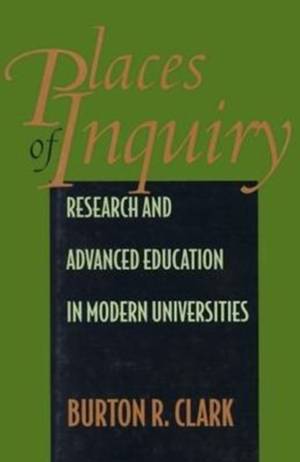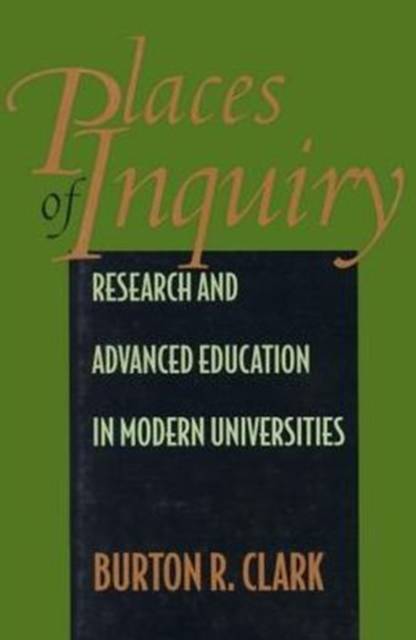
Bedankt voor het vertrouwen het afgelopen jaar! Om jou te bedanken bieden we GRATIS verzending (in België) aan op alles gedurende de hele maand januari.
- Afhalen na 1 uur in een winkel met voorraad
- In januari gratis thuislevering in België
- Ruim aanbod met 7 miljoen producten
Bedankt voor het vertrouwen het afgelopen jaar! Om jou te bedanken bieden we GRATIS verzending (in België) aan op alles gedurende de hele maand januari.
- Afhalen na 1 uur in een winkel met voorraad
- In januari gratis thuislevering in België
- Ruim aanbod met 7 miljoen producten
Zoeken
Places of Inquiry
Research and Advanced Education in Modern Universities
Burton R Clark
Hardcover | Engels
€ 98,45
+ 196 punten
Omschrijving
A distinguished work by one of America's leading scholars of higher education, Places of Inquiry explores one of the major issues in university education today: the relationship among research, teaching, and study. Based on cross-national research on the university systems of Germany, Britain, France, the United States, and Japan--which was first reported in the edited volume The Research Foundations of Graduate Education (California, 1993)--this book offers in-depth comparative analysis and draws provocative conclusions about the future of the research-teaching-study nexus.
With characteristic clarity and vision, Burton R. Clark identifies the main features and limitations of each national system: governmental and industrial dominance in Japan, for example, and England's collegiate form of university. He examines the forces drawing research, teaching, and study apart and those binding them together. Highlighting the fruitful integration of teaching and research in the American graduate school, Clark decries the widely held view that these are antithetical activities. Rather, he demonstrates that research provides a rich basis for instruction and learning. Universities, he maintains, are places of inquiry, and the future lies with institutions firmly grounded in this belief.
With characteristic clarity and vision, Burton R. Clark identifies the main features and limitations of each national system: governmental and industrial dominance in Japan, for example, and England's collegiate form of university. He examines the forces drawing research, teaching, and study apart and those binding them together. Highlighting the fruitful integration of teaching and research in the American graduate school, Clark decries the widely held view that these are antithetical activities. Rather, he demonstrates that research provides a rich basis for instruction and learning. Universities, he maintains, are places of inquiry, and the future lies with institutions firmly grounded in this belief.
Specificaties
Betrokkenen
- Auteur(s):
- Uitgeverij:
Inhoud
- Aantal bladzijden:
- 308
- Taal:
- Engels
Eigenschappen
- Productcode (EAN):
- 9780520087620
- Verschijningsdatum:
- 11/07/1995
- Uitvoering:
- Hardcover
- Formaat:
- Genaaid
- Afmetingen:
- 152 mm x 229 mm
- Gewicht:
- 580 g

Alleen bij Standaard Boekhandel
+ 196 punten op je klantenkaart van Standaard Boekhandel
Beoordelingen
We publiceren alleen reviews die voldoen aan de voorwaarden voor reviews. Bekijk onze voorwaarden voor reviews.









